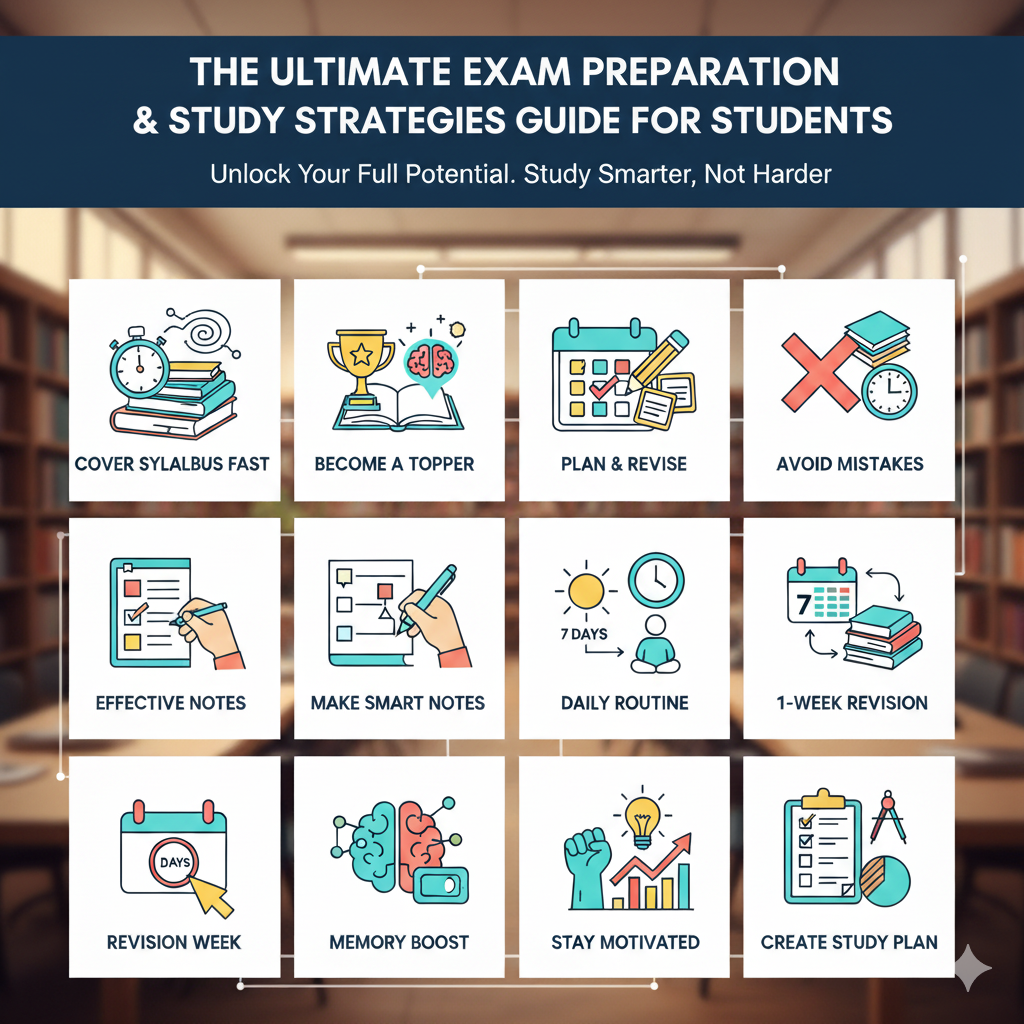Exams have always been milestones that shape a student’s academic journey—whether it’s board exams, semester assessments, or competitive entrances. For many, the word “exam” immediately brings stress, long nights, and endless pressure. But here’s the truth: success in exams doesn’t depend on last-minute cramming—it depends on smart strategies, consistent planning, and disciplined practice. The A2ZLY Team is here to guide students at every step, providing tips, resources, and support to make exam preparation more effective and less stressful.
This Exam Preparation Guide 2025: 10 Proven Strategies to Score High Like a Topper is designed to give you everything you need: topper strategies, smart study hacks, and proven tips to cover a huge syllabus effectively. By the end, you’ll know how to plan, revise, and enter the exam hall with confidence.
📑 Table of Contents
Why You Need This Exam Preparation Guide 2025

Every year, thousands of students set out to “study harder,” but only a few consistently achieve top ranks and high scores. The difference lies not in talent, but in approach. Top scorers know how to:
- Focus on important topics first.
- Use memory techniques to retain longer.
- Revise multiple times instead of reading once.
- Balance study + rest without burning out.
In this ultimate guide, you’ll explore 10 proven strategies that successful students swear by. Follow them step by step, and you’ll transform the way you prepare for exams.
1. How to Cover a Huge Syllabus in Less Time: Smart Study Hacks

One of the biggest exam fears students share is: “How do I complete such a huge syllabus before exams?” The solution lies in breaking it down into manageable chunks.
✅ Strategies to Cover Syllabus Effectively:
- Break chapters into small daily targets—never try to do everything at once.
- Apply the Pareto Principle (80/20 Rule): 80% of questions come from 20% of chapters. Focus on high-weightage topics first.
- Use the Pomodoro Technique (25 minutes study + 5 minutes break) to maintain focus.
- Replace endless re-reading with mind maps, summary notes, and flowcharts.
💡 Pro Tip: Create a weekly syllabus tracker—ticking off completed topics gives you instant motivation and builds momentum.
2. How to Become a Topper: Habits & Study Strategies of High Scorers

Toppers aren’t superheroes—they’re students with better habits. What sets them apart is consistency, clarity, and discipline.
✅ Habits of Toppers:
- Goal-Oriented Planning: Each study session is aligned with long-term results.
- Block Scheduling: Study in 2–3 hour deep-focus sessions instead of scattered hours.
- Active Revision: Toppers revise each topic 3–4 times before exams.
- Balanced Lifestyle: They sleep well, eat healthy, and exercise to maintain energy.
💡 Pro Tip: Don’t copy toppers’ hours—copy their methods. It’s about studying smarter, not harder.
3. Best Exam Preparation Strategy: Plan → Learn → Revise → Test

A winning strategy can be summed up in four words: Plan → Learn → Revise → Test.
- Plan: Break your syllabus into monthly, weekly, and daily goals.
- Learn: Don’t just read—actively engage with the content (ask questions, solve examples, relate to real life).
- Revise: Revise each chapter at least 3 times before exams.
- Test: Attempt mock papers and past years’ papers to check speed and accuracy.
💡 Pro Tip: Follow the 3R Rule – Read, Recall, Revise.
4. 10 Common Mistakes Students Make During Exams (and How to Avoid Them)

Even bright students lose marks due to avoidable mistakes.
❌ Common Mistakes:
- Misreading the question or missing key terms.
- Spending too much time on one answer.
- Ignoring diagrams, graphs, or maps.
- Weak time management.
- Pulling all-nighters before exams.
✅ How to Avoid:
- Read questions twice before writing.
- Attempt easy questions first for confidence.
- Allocate fixed time per question.
- Sleep at least 7 hours before exam day.
💡 Pro Tip: Always leave 10 minutes at the end to review your answer sheet.
5. How to Make Effective Notes for Quick Revision

Notes are your secret weapon in last-minute prep.
✅ Effective Note-Making Methods:
- Use bullet points, flowcharts, and diagrams instead of long paragraphs.
- Highlight formulas, dates, and keywords.
- Create one-page summaries per chapter.
- Keep a separate “cheat sheet” notebook for formulas & definitions.
💡 Pro Tip: Try the Cornell Note-Taking Method—divide the page into main ideas, notes, and summary. It’s highly effective for revision.
6. Daily Routine of Successful Students

A good routine gives structure to your day and reduces stress.
✅ Sample Toppers’ Routine:
- 5 AM – 6 AM: Quick revision of yesterday’s topics.
- 6 AM – 9 AM: Deep focus study (most difficult subjects).
- 10 AM – 1 PM: Practice problems / writing-based subjects.
- Afternoon: Rest + light revision.
- Evening: Mock tests or past papers.
- Night: Quick review + sleep by 10 PM.
💡 Pro Tip: 7 hours of sleep is non-negotiable. Memory and focus decline sharply without it.
7. How to Revise an Entire Syllabus in One Week

Last week panic? Stay calm—revise strategically.
✅ 7-Day Plan:
- Day 1–3: Focus on weak areas.
- Day 4–5: Revise strong subjects.
- Day 6: Attempt a full mock test.
- Day 7: Revise formulas, keywords, and one-page notes.
💡 Pro Tip: Avoid starting new topics in the last week—it creates confusion.
8. Memory Retention Techniques: Learn Faster, Remember Longer

Smart students use techniques that hack memory.
✅ Techniques to Remember Longer:
- Spaced Repetition: Revise after 1 day → 3 days → 1 week.
- Active Recall: Test yourself instead of passive re-reading.
- Mnemonics: Acronyms (like BODMAS) make recall easy.
- Mind Maps & Flashcards: Visual tools boost memory.
- Feynman Technique: Teach someone else—if you can explain, you’ve mastered it.
💡 Pro Tip: Combine reading + writing + speaking for maximum retention.
9. How to Stay Motivated During Exam Preparation

Motivation fuels consistency. Without it, even the best plan fails.
✅ Motivation Hacks:
- Break large goals into small wins.
- Reward yourself (e.g., treat after completing chapters).
- Avoid comparing with others.
- Put motivational quotes near your desk.
- Study with a partner or accountability buddy.
💡 Pro Tip: Write this near your desk:
👉 “One day, these struggles will be your strength.”
10. How to Create a Subject-Wise Study Plan

Balanced preparation requires a subject-wise timetable.
✅ Steps to Create Your Plan:
- Analyze syllabus weightage for each subject.
- Prioritize high-weightage topics first.
- Assign 2–3 subjects daily for variety.
- Keep 1 hour daily only for revision.
📌 Example Plan:
- Maths: 20–30 sums daily.
- Science: Theory + 1 diagram per day.
- Social Science: Maps & timelines.
- Languages: Grammar + comprehension practice.
💡 Pro Tip: Track your progress with a color-coded timetable—visual progress keeps you motivated.
❓ Frequently Asked Questions (FAQs) on Exam Preparation 2025
1. What is the best exam preparation guide for 2025?
The best exam preparation guide 2025 focuses on smart study techniques, topper strategies, and effective revision methods. Instead of cramming, follow a structured plan: cover important topics, revise multiple times, and practice with mock tests.
2. How can I cover a huge syllabus before exams?
Break your syllabus into smaller chunks, prioritize high-weightage chapters, and use smart hacks like the Pomodoro Technique and summary notes. A weekly tracker helps you stay on schedule and reduce exam stress.
3. What are topper strategies for exams?
Toppers use goal-oriented planning, block study sessions, active recall, and repeated revision. They don’t just study longer—they study smarter by balancing time, health, and consistency.
4. How many hours should I study to score high in exams?
It’s not about the number of hours but about study quality. On average, 6–8 focused hours a day with breaks, active learning, and proper sleep is more effective than 12+ hours of passive studying.
5. How do I stay motivated during exam preparation?
Stay motivated by setting small goals, rewarding yourself after milestones, avoiding negative comparisons, and reminding yourself that consistent effort leads to success. Surround yourself with positivity and supportive peers.
6. How can I revise my syllabus in one week?
In the last week, focus on quick revisions of formulas, definitions, and notes. Avoid new topics. Dedicate the first few days to weak areas, take a full mock test on Day 6, and do light revision on the final day.
🎯 Final Thoughts: Your Roadmap to Exam Success
The Exam Preparation Guide 2025 is not about memorizing more—it’s about studying smarter, revising strategically, and managing time effectively.
By applying these 10 proven strategies—from covering a huge syllabus and adopting topper habits, to mastering note-making, memory techniques, and subject-wise planning—you’ll not only prepare better but also walk into the exam hall with confidence and calmness.
👉 Start today. Stay consistent. Success will follow.
📌 If you found this guide useful, share it with your friends and bookmark it for future revisions.

